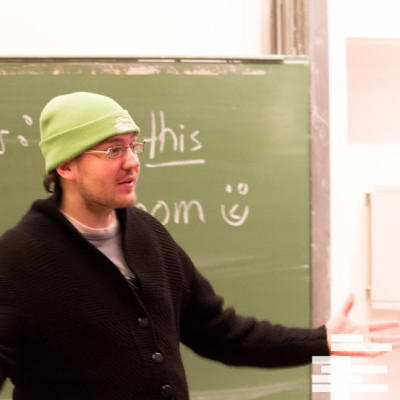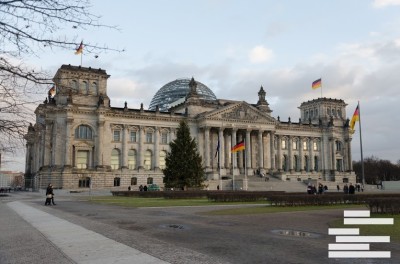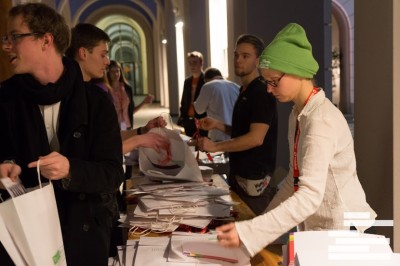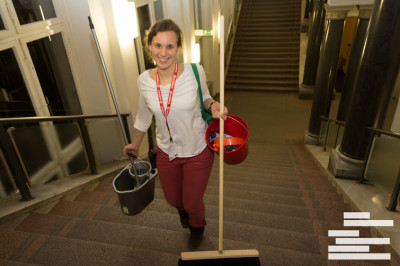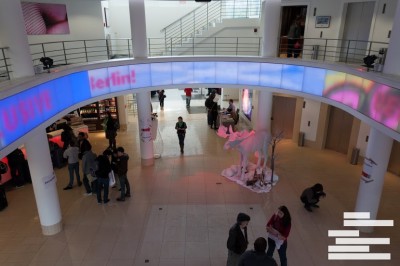WUDC Countdown 1: WUDC Berlin 2013 at a glance
It is impossible to find out when the first participants of WUDC 2013 arrived in Berlin – too many have already been around and have spent some days in Europe, Germany or Berlin. But just from a glimpse into the WUDC accommodation, Hotel BerlinBerlin, it is clearly visible: today was arrival day! Dozens of participants dropped into the Hotel each hour and stopped at the registration desk in order to check in to their “Worlds” 2013. And in less than 24 hours, Patrick Ehmann, Convener of WUDC Berlin 2013, will open the 33rd World Universities Debating Championship officially.
Thus, the biggest debating event in the World is about to start. But what will happen during the next seven days? So many things are scheduled and the tournament got that big that it almost seems impossible to get an overview. That’s why you have Worlds 2013 at your fingertips, at a glance – all that will happen until the winners are going to be announced during the Championship dinner in the night of the 3rd of January 2013. As we already discovered, our exploration seems to be endless – we will constantly update this article with new or more precise information.
This years World University Debating Championship cover 82 countries and 1400 participants: 800 speakers, 300 adjudicators, 200 volunteers and 110 scholarship participants. A look into the list of team allocation shows that the biggest delegation by far is coming from the US with 35 teams, followed by England (35), Canada (25) and Australia (24). Then follows the biggest non-English speaking delegation from the Netherlands with 19 teams, followed from Japan with 16 teams. There are 11 German teams in the competition and a total of 278 different institutions. The complete list of allocation of team slots can be found here.
The motions for all 19 different rounds are set by the Adjudication Core: In this team, Sharmila Parmanand form the Philippines and Douglas Cochran from England will serve as Chief Adjudicators. Their team is completed by Deputy Chief Adjudicators Victor Finkel (Australia), Isabelle Fischer (Germany) and James Kilcup (USA). Jens Fischer from Berlin, Germany, will support the team as Tab Master, thus running the computer program behind a tournament of 800 speakers. All motions, of course, will be published only 15 minutes before the round which are all hold in British Parliamentary Style as written down in the WUDC constitution.
In three language categories, the debaters will fight for the championship’s titles: The „main“ category with the Open Break in which all speakers are allowed to speak and break. Next, English as a Secondary Language (ESL) is open for all speakers except of those that learned English as a mother tongue. English as a Foreign Language (EFL) is open only for those speakers that have not spend more than three months in an English speaking country. The language committee, headed by Anne Valkering from the Netherlands and Michael Saliba from Germany, will asses each participant’s language status before round one of the tournament. The language categories, however, won’t be relevant before the break rounds: During the nine preliminaries on 29th, 30th and 31st of December, all debaters will debate in one tournament. Only when computing the break into break rounds, the tournament is split into three different categories. Then, the best 48 teams of the tournament qualify for the Open Break Octo Finals (see more on that in „Break rules revised“), the 16 teams eligible for ESL break into ESL quarter finals and the best eight EFL teams break into the EFL semi final. Thus, it is possible that an ESL team breaks into two break rounds, since teams that qualify for ESL or EFL respectively of course also count for the Open Break.
This is the main tournament. But Worlds wouldn’t be Worlds if there weren’t loads of other things to happen during the next days.
How to stay up to date:
Manuel Adams, head of communications of WUDC, will post official results and motions regularly on the official WUDC blog. You can also follow Worlds on Facebook and Twitter. Also, there’s a live page on the WUDC homepage that will broadcast the finals on the 3rd of January as well as two different rooms during the preliminary rounds. For everything else, and most importantly for everything that is not official, you will have us: Achte Minute, the magazine of German and international debating, will broadcast live from WUDC Berlin 2013 here on our magazine via Twitter (follow @achteminute) and Facebook. During the upcoming days, our team will give you insight into this year’s Worlds. Finally, you may read WUDCwatch, the official newspaper published every other day during WUDC Berlin 2013. The official WUDC hashtag is #WUDC.
What are the side-events?
Two main side (yeah, „main side“!) events will happen around the major competition: A public speaking competition and the Worlds Master’s Cup. The public speaking competition is open for every WUDC participant. Registration takes place here until the 28th in the morning. As adjudication core serve Mathias Hamann, debater from Germany and Kimera Chettey from South Africa. The preliminary rounds will take place on December 28 and the public speaking final will be on January 2. The Worlds Masters‘ Cup is a debating competition for all judges of this year’s WUDC. In the Masters’ Cup national teams of three WUDC adjudicators each compete in two preliminary rounds and a final. Registration ends tonight (27th of December). As chief adjudicators serve Philipp Stiel, debater from Streitkultur Tübingen in Germany, and Bronwyn Cowell from Australia. The preliminary rounds will take place in the morning of the 28th and the final in the night of the 2nd of January.
Socials
Of course, WUDC 2013 participants may expect socials and a number of different theme nights. The socials start with the opening ceremony of WUDC 2013 in the night of the 28th, featuring an opening lecture by the Berlin Bureau Chief of The Economist. The Gender Night (formerly known as Women’s Night) will follow with a big fundrasing event for Terre des Femmes and their fight for women’s rights. On the 30th, WUDC will move literally underground with a big underground party in BRUNNEN 70, a party location in Berlin’s underground. No need for smart casual dress code there – things might be a little dirty downstairs. Following that the break night on New Year’s eve – celebrated at TU Berlin with direct access to the street to watch the big firework at Brandenburg Gate – at the supposedly biggest party in the world. The night after the long long will be the night of Chennai, the next host of WUDC in India. They will present a night full with Indian flavour and music – a big surprise to come which will take place at Löwensaal Berlin. Before the end of the tournament, the side events will finish with a Grand Final of the Masters Cup and the Comedy Night and public speaking final, both in the evening of January 2. The big final will be the Championship Dinner and Award Ceremony taking place the night of the 3rd of January – before all the fun is over.
Important people making important decisions:
During the Championship, the WUDC Council will take place twice: The first time for a preliminary meeting the morning of the 28th of December and the second meeting on January 1st (this session is open for everyone to watch). The WUDC Council consists of the representatives of WUDC participating countries depending on an elegibility scheme. Major tasks are to appoint a host for WUDC 2015 and to confirm Chennai as the host for WUDC 2014.
Why do we have double octo-finals at these Worlds?
One specialty during these Worlds are the so-called “Partial Double Octo-Finals”. Basically, they are quite a complicated solution for quite a complicated problem: the question how to determine the team break if teams around the last team in the break have the same number of team points. The last WUDC Council in Manila decided to introduce another round after the preliminary rounts, the Partical Double Octo-Finals. However, there are several countries which want to change this again, possibly before the new rule is enforced on New Years Eve 2012 here in Berlin. For the whole story, read about how Marcus Ewald, President of the European Universities Debating Council, explained that new system to us.
What if people get angry about each other?
With 82 nationalities and probably even more cultural backgrounds, it is natural for misunderstandings to arise. That’s why WUDC Berlin 2013 has an Equity Team. This team can be approached by all participants, judges and adjudicators alike, if they feel treated badly or hurt in some way by a member of the tournament. In case of an approach, Equity Officer Sarah Jaglitz (Germany) and her team Ahmed Al Suwaidi (UAE/UK) and Beth Sheil (USA) will take care of the situation. Read more here.
:–>


